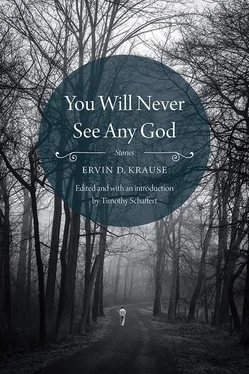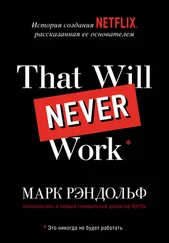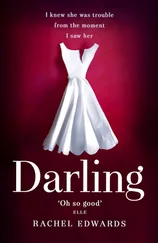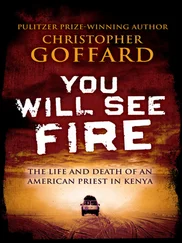The tractor was there, and Rudy Heron left it running wide-open, very loudly, and he jumped down and walked over to us, and in the cart the children peeped over the edge at their father and us.
“Is my wife here?” Rudy asked, striding towards us. He was a slightly built man, dark-faced, and his jaw and face were long and narrow, and he had not shaved, and the thin sliver of a scar on the tip of his chin was very white against his blue-black face. His eyes were small and yellowish and glittering, unalive, like the eyes I had seen in dead animals.
“Is my wife here?” he asked loudly, again, and he came on into our midst.
“She’s here,” my brother said, holding his arm out and stopping Heron. Heron struck at my brother’s arm, but my brother turned with him, stepping back, but still between him and the bodies.
Heron looked at my brother’s face, and then he seemed to get control of himself, and he said, “I want to see my wife. Which one is she?”
“Here,” my brother said. He backed away from Heron, and he knelt and pulled the blanket down an inch or two to expose the upper part of the dead woman’s face.
Heron looked at her, and he rubbed his beard and his eyes, and we thought he might be crying, but then he asked, “Who was she with?” He turned to look at the ashen-faced and sober men. “Who?” No one said anything.
Heron’s eyes burned us one by one. “Who?”
“Conrad Wenzel,” Heintzelman said, coughing out the name. “He must have been bringing her home, and they made a wrong turn, got lost, and thought this was a farm or something. Probably got stuck.” Heintzelman was speaking rapidly, but his voice gradually became less and less firm. “It was easy for Wenzel to get lost. He’s not from around here, you know.” His voice trailed off.
“I know,” Heron shouted. “I know Wenzel. Come mooning around my wife. I seen what was going on.” He looked at the woman’s face. “Who found them?” he asked.
“I did,” I said.
“And how was they? What was they doing?”
“Sitting,” I said. “Sitting in the front seat, dead. It was the gas from the engine…”
“Sitting! Hah! Sitting!” Heron leapt suddenly at the blanket-covered body of the woman and he tore the blanket back, out of my brother’s hands, and Heron began to howl, and he laughed and howled, and he fairly leaped around the body, and he turned and bellowed for the children to come there and look at their dead mother. “Come,” he bellowed, in his strangely deepened and rasping voice. “Look at her, look what she was doing when she died. She’s a whore. Look, your mother’s a whore. Come look, see what she is.” Suddenly he flung the blanket away, and the wind picked it and rolled it, and Heron plunged at the other body, while we stood there, frozen, watching him, and none of us could move. Heron tore that blanket off too. He began to kick the body, hard, with his heavy boots, and he kicked at the groin of the dead man, as if all of the dead man and all of Heron’s hate were concentrated there, and Heron was howling and his face was wild and he was frothing at the mouth and the froth froze on his face, like white scars.
My brother caught Heron’s arms and pulled him away, but Heron lunged at my brother and shoved him backwards, over the body of the woman, into the snow. Heron seized one of the sticks I had cut for the fire, and he began to beat on the face and body of the dead man, and the body rolled onto its back and the frozen hands were at its shoulders, supplicating, and the eyes and the mouth were open, and the dead man seemed to be screaming, bleating in agony, but the only sound was the other agony of Heron in his shrieking. Heron slashed and beat with the stick upon the dead body, and the stick made terrible, coldly white, everlasting marks on the frozen flesh, making the peculiar gritting sound like the sound a spoon inserted into a half-frozen box of berries makes, and the marks of the stick would never be erased.
The men stood back in a cluster, horrified, afraid of Heron. Only my brother knew what to do. He came up again, and he spun Heron around and tried to hold him away from the mutilation, but Heron struck my brother on the shoulder with the stick. I moved behind Heron and I jerked his arm behind his back and twisted at the claws of his hand until the stick came free, and I kicked it away, into the fire. Heron twisted loose, and he came towards me, howling everything and nothing. I hit him on the mouth, and his eyes didn’t change at all, in spite of the blood in his mouth, and he kept howling and spitting blood. I pulled my arm back quickly and I hit him hard, back-handing him with the hard leather mitten across his face, and the blow made him groan and blink and turn, and I went in quickly and I brought my arm beneath his and twisted him over, and my brother was helping me, and we swung Heron down, crashing him hard against the frozen ground and snow, and his face drove into the packed snow.
I put my knee on him, and I leaned over him and I said, “Come to yourself, man.”
It was all out of him then. He lay there, gargling and spitting saliva and blood, and he made biting motions in the snow, and even when I stood up he just lay there, and he was crying, and making noises as a hungry animal makes when it is eating ravenously, and his jaws worked on the snow. It was terrible, listening to him, and all the men were frightened and ashamed, and they wouldn’t look at him. We all knew that in a way Heron truly loved the woman, in spite of everything, he did love her, and he was a victim of that, and he hated her, too, and it was something none of us could help him with.
My brother went around Heron and he carefully wrapped the bodies again.
The children had come from the cart and I did not know how long they had been standing there. They had been watching, and their eyes were seared with it all, and they were terrified. There were four children and the oldest was about seven and the youngest about two, and both the oldest and the youngest were girls, and the middle two were boys.
“Why did he bring them?” I said, and I looked again at the man groveling in the snow, and I wanted to drive my boot into his groaning side.
I went around to the children and I brought them up to the fire to warm them and I carefully turned them away so they could not see their father. The children were frightened and quiet, but they kept turning their heads to see the man.
They were terribly cold in that bitter wind, and they had been dressed hurriedly and badly, and the little girl had lost a mitten and her overshoes were on the wrong feet. I rubbed her frigid cheeks and I gave her my large mitten to put on and I tried to play with her, to have her smile, but she would not. She said some words that children say very early and I felt my jaw trembling, and I could not speak at all, and I set her gently on a little log and I took off her overshoes and put them on the right way. I buttoned the other children up properly, and gave my scarf to the older boy, who did not have one. I took the children to the cart again, after they were a little warm, and the oldest girl was crying and looking back at her father, and I could tell in her eyes that she had seen too much, and she would never forget any of it now, none of them would ever forget. It was terrible, that understanding look, that recognition in a child’s eyes. When the other children saw their sister crying, they too began to cry. And I thought, we have done this to them, all of this; it was as much our fault as the fault of their father.
I put them on the cart, one by one, and I tried to comfort them, but it was no use. Even in my arms they remembered too well, and they looked past me to see their father and mother. I motioned to my brother, for I couldn’t speak, and he brought some blankets from the car, the ones they, the mother and the man, had used to cover themselves, and I wrapped the children warmly. Kamrad came over to drive the children to our place. My brother stood beside me and watched Kamrad and the tractor and the children go, but I could not see them, for my eyes were blinded by that glaring sun and the vivid, hurting snow, and my nose was running, and wetness froze on my cheeks.
Читать дальше











